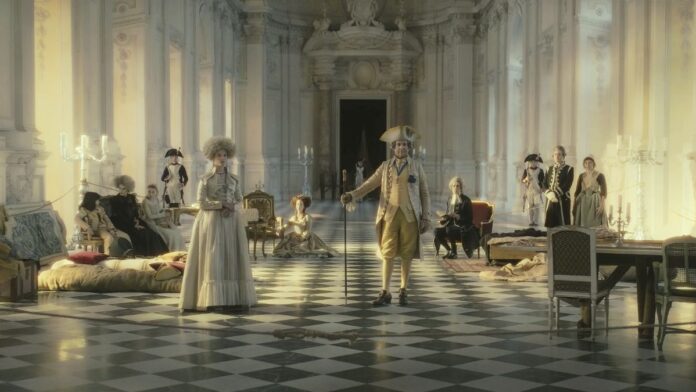The famous French saying, “Après moi, le déluge” (“After me, the flood”) is often attributed to Louis XV, expressing his disregard for the aftermath of his reign. However, it is his grandson, Louis XVI, who truly embodies this sentiment. Ousted during the French Revolution and ultimately executed by guillotine, Louis XVI’s demise, alongside that of his wife, Marie-Antoinette, signified the end of the monarchy and the zenith of the Reign of Terror. Their deaths also heralded the dawn of modern democracy in France, albeit one marked by tumult and bloodshed.
A Gripping Tale of Decline and Humanity
Gianluca Jodice’s The Flood (Le Déluge) zeroes in on the tumultuous final days of Louis XVI and Marie-Antoinette, capturing the couple’s descent from power. Unlike previous historical dramas that focus on the rise and fall of the royal pair, Jodice’s narrative is confined to their imprisonment in the Temple Prison in Paris. Here, stripped of their regal splendor and sequestered with their children and loyal servants, they confront their shattered lives and the end of nearly a millennium of monarchy.
An Unexpected Humanization of Royalty
Portrayed by Guillaume Canet and Mélanie Laurent, Louis and Marie-Antoinette emerge as more relatable and vulnerable than ever. Initially depicted as a bewildered ruler overwhelmed by the revolution, Louis evolves into a dignified patriarch facing his fate with grace. Marie-Antoinette, often viewed through history as a superficial figure, is shown in a new light—sympathetic, fiercely loyal to her family, and remarkably perceptive of their dire situation.
Historical Accuracy vs. Artistic Liberty
Inspired by the journal of Louis’ valet, Jean-Baptiste Cléry, The Flood blurs the line between historical fact and speculative fiction. While the film offers a more humanized portrayal of the king and queen, it also leans heavily towards portraying them as victims rather than the often ruthless and disconnected rulers they were known to be. The revolutionaries, conversely, are depicted predominantly as vengeful antagonists.
Despite these narrative choices, the nuanced performances by Canet and Laurent prevent the characters from becoming mere caricatures. Canet’s Louis is a complex figure, managing to convey a sense of awareness and acceptance of his wife’s infidelities and his impending doom. Laurent’s Marie-Antoinette, meanwhile, is given a depth that contrasts with her previous depictions in popular culture, such as Kirsten Dunst’s portrayal in Sofia Coppola’s Marie-Antoinette.
A Cinematic Apology?
Jodice’s direction, while empathetic towards the royal couple, does not shy away from depicting the harsh realities of the French Revolution. The film underscores the brutality of the period, highlighting the Reign of Terror that followed Louis XVI’s execution, where thousands were guillotined.
Cinematographer Daniele Ciprì’s work is notable, using tableau-like visuals reminiscent of Peter Greenaway to create an intimate, almost claustrophobic atmosphere within the prison walls. However, this limited scope also serves as the film’s primary flaw, as it restricts the audience’s view of the broader revolutionary fervor and monumental changes happening outside.
A Narrow Focus on a Broader Revolution
While The Flood offers a compelling and humanizing look at Louis XVI and Marie Antoinette, it sometimes loses sight of the larger historical context. The film presents their end as a tragic close rather than the beginning of a new era. Jodice’s focus on the personal over the political leaves out the larger narrative of a society overthrowing centuries of despotism and paving the way for modern democracy.
Final Words:
The Flood is an evocative retelling of the final days of France’s last royal couple, showcasing their transformation from distant rulers to relatable, tragic figures. While it may lean towards a sympathetic portrayal, it also serves as a stark reminder of the brutal realities of revolutionary change. As an opening feature for the Locarno Film Festival, it is both a compelling drama and a thought-provoking exploration of a pivotal historical moment.
Must Read: Borderlands Movie Review: Cate Blanchett Stars in Eli Roth’s Disappointing Video Game Adaptation




